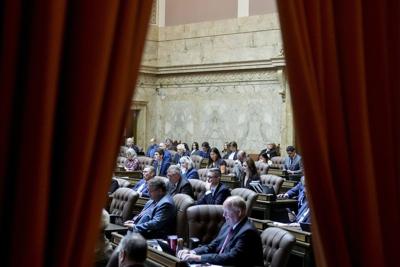This year’s Washington state legislative session was a short one, but leaders delivered on a project that will make a long-lasting impact on our community. In the closing hours of the session, a bipartisan team of legislators worked together to approve $800,000 for a new drop-in center that will help to stabilize hard-to-reach populations while improving the vibrancy of Yakima.
A drop-in center is a place where people who are challenged by homelessness, substance use disorders or living with medical and physical health complexities can access much-needed services, socialization, education and basic resources. It’s a place where they can find community and acceptance. Not only does it help make people’s lives better, but it also positively affects our greater community by reducing hospitalizations and law enforcement interactions and supporting efforts toward housing and employment.
Securing state funding for this project was truly a team effort. A bipartisan coalition of lawmakers — from diverse districts and political backgrounds — came together, led by primary sponsor Rep. Bruce Chandler, R-Granger, and supported by Sen. Mark Mullet, D-Issaquah, Sen. Mark Schoesler, R-Ritzville, Rep. Chris Corry, R-Yakima, Sen. Curtis King, R-Yakima, Rep. Gina Mosbrucker, R-Goldendale, Rep. My-Linh Thai, D-Bellevue, and Sen. Judy Warnick, R-Moses Lake.
We’re grateful for their leadership — and determined to continue momentum as we begin the process of renovating one of our day-treatment sites in Yakima to house the drop-in center. The city of Yakima is also exploring its ability to provide additional funding. We’re eagerly awaiting their decision, as the city’s partnership will be key to realizing the center’s full impact on our community.
Once the facility is complete in 2025, we will welcome at-risk community members who often face barriers to care and stigma which leads to an economic, social and health cost to our communities. The drop-in center helps those on their road to recovery by providing food, clothing, showers, laundry, computer access and bus tokens, as well as peer support, social activities, skilled based groups, and longer-term services such as case management, and supportive employment.
This project helps achieve Comprehensive Healthcare’s justice, equity, diversity and inclusion (JEDI) goals by ensuring equal access and opportunity to Comprehensive Healthcare programs without discrimination. Individuals will not need to be enrolled in mental health or addiction services to use the center. By making it accessible, we can help address the isolation felt by many in mental health or addiction recovery and create a welcoming space to make friends and learn new skills.
Our goal is to create pathways to empowerment and long-term change, with options for professional, educational and employment readiness training, connection to job opportunities, housing services, referrals to substance use disorder programs, support groups and community empowerment initiatives that help strengthen interpersonal networks and social support.
Importantly, we’ll implement evidence-based models with proven outcomes. Research has shown that 70% of those participating in a drop-in center in the state of Alaska stayed out of hospitals and held jobs, which helped them to live independently. In some states, law enforcement interactions with clients who were supported by drop-in centers decreased because clients learned problem-solving which helped them with their social-emotional skills and led to better outcomes.
Thanks to the collaboration and resolve of our state leaders, the new drop-in center is well on its way to filling a critical need in our community, and bolstering the full spectrum of innovative services, programs and partnerships that Comprehensive Healthcare offers throughout the Greater Columbia Region. It shows that together with state and local support, we can implement creative solutions in behavioral health care and beyond to evolve, build resiliency and meet the changing needs of our clients by serving them where they are.




